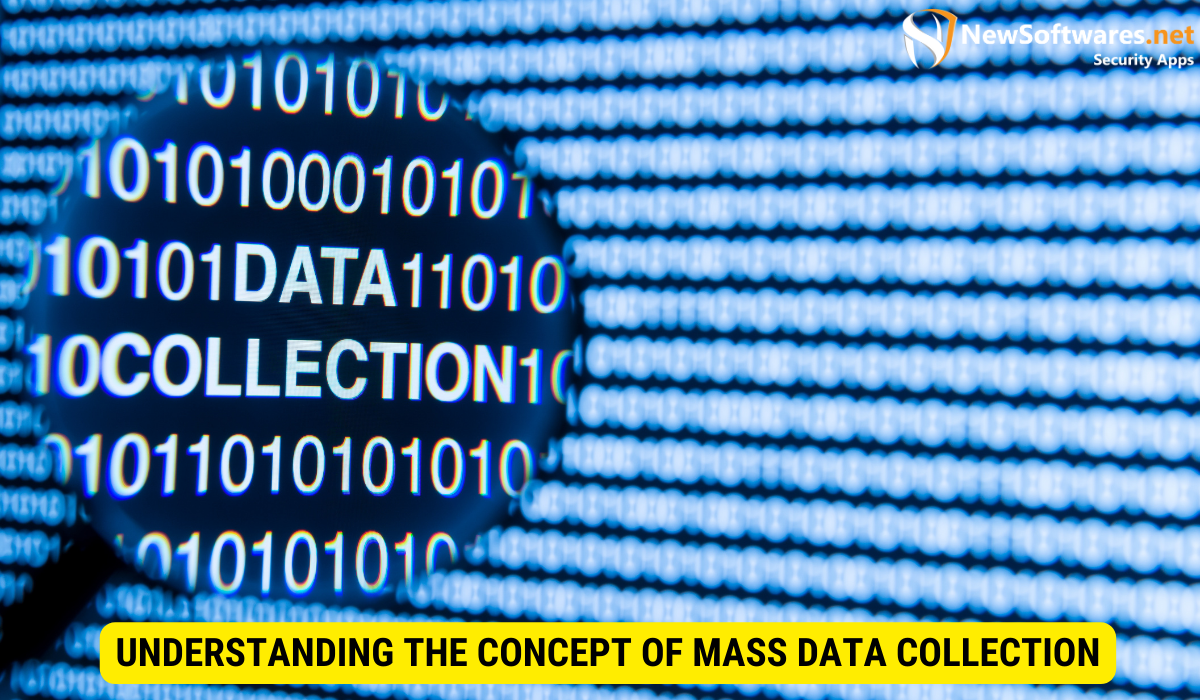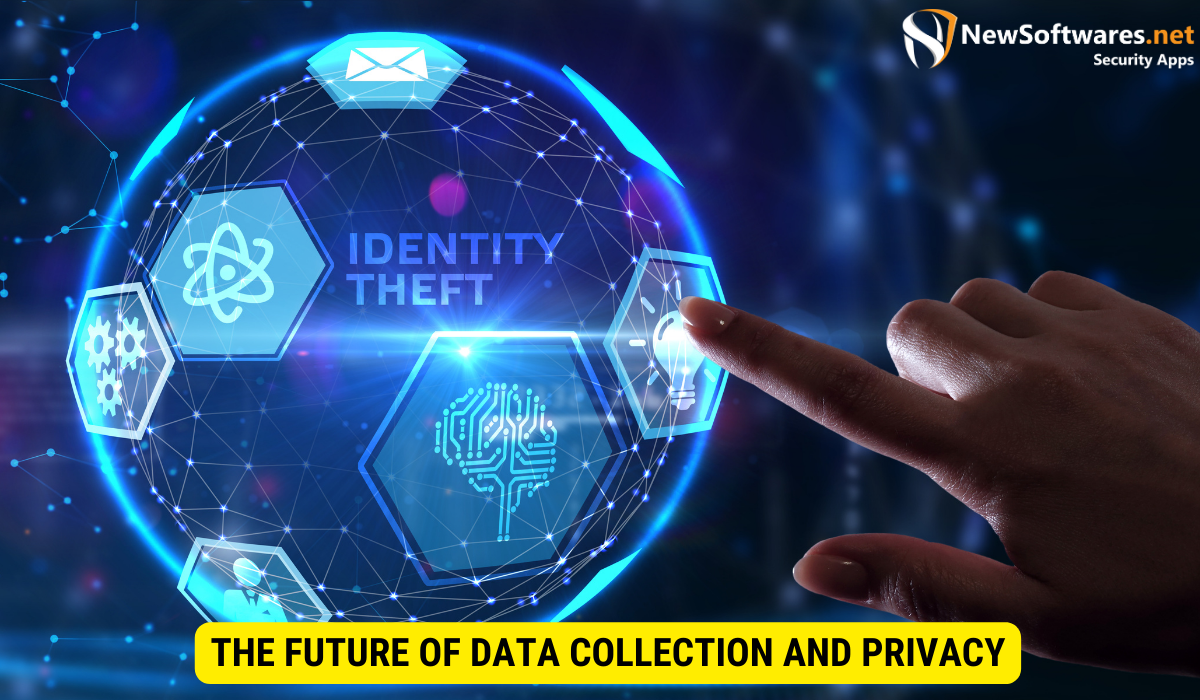Mass data collection infringes on privacy by potentially enabling identity theft and fraud, facilitating unwanted surveillance and monitoring, leading to personal information leakage, and raising concerns about the ethical use and control of personal data.
“Mass collection of data” refers to the practice of gathering and analyzing large volumes of information from various sources such as websites, social media platforms, and connected devices. While this may seem like an innocuous process aimed at improving services and enhancing user experiences, it raises significant concerns about privacy infringement. Together, we will explore the concept of mass data collection, its intersection with privacy, legal perspectives, the role of big tech, and the future of data collection.
Understanding the Concept of Mass Data Collection

Mass data collection is a complex and pervasive practice that has become an integral part of our digital lives. It involves the systematic gathering and analysis of vast amounts of personal and non-personal information, providing organizations with valuable insights into consumer behavior, preferences, and trends. This information can include browsing history, location data, social media interactions, purchase behavior, and much more.
The collection of this data is often facilitated through various means, such as cookies, tracking pixels, and user agreements that allow organizations to access and utilize individual data. Cookies, for example, are small text files stored on devices to track user activities. They enable websites to remember user preferences and provide a personalized browsing experience. However, they also serve as a tool for data collection, allowing organizations to gather information about users’ online behavior.
In addition to cookies, there are other mechanisms through which data collection takes place. Device identifiers, for instance, are unique identifiers assigned to devices, such as smartphones or tablets, which allow organizations to track user activities across different platforms and devices. Web beacons, on the other hand, are small transparent images embedded in web pages or emails that can track user interactions and provide valuable data to organizations.
Data brokers play a significant role in mass data collection as well. These entities aggregate and sell personal information without direct consent from individuals. They collect data from various sources, such as public records, social media platforms, and online surveys, and then package and sell this information to organizations for targeted advertising, market research, and other purposes.
Furthermore, organizations can collect information through online surveys, loyalty programs, and social media platforms, further expanding their reach into people’s lives. Online surveys provide organizations with direct insights into consumer preferences and opinions, while loyalty programs enable them to track purchase behavior and offer personalized incentives. Social media platforms, with their vast user base and extensive data collection capabilities, allow organizations to gather a wealth of information about individuals’ interests, social connections, and online activities.
It is important to note that while mass data collection has its benefits, such as enabling personalized experiences and targeted advertising, it also raises concerns about privacy, consent, and the potential for misuse of personal information. As individuals become more aware of the extent of data collection and its implications, discussions around data privacy and protection continue to evolve.
The Intersection of Data Collection and Privacy
The Concept of Privacy in the Digital Age
Privacy is a fundamental human right, but its definition is evolving rapidly in the digital age. With the proliferation of data collection, individuals’ personal information has become an increasingly valuable commodity. Privacy encompasses the ability to control what data is collected, how it is used, and who has access to it. However, the vast scope and scale of data collection often exceeds individuals’ control, leading to privacy concerns.
In today’s interconnected world, where technology permeates every aspect of our lives, the concept of privacy has taken on new dimensions. As we navigate the digital landscape, we leave behind a trail of data that can reveal intimate details about our lives. From the websites we visit to the products we purchase, every online interaction leaves a digital footprint. This constant stream of information is collected, analyzed, and stored by various entities, raising questions about the boundaries of privacy.
Furthermore, the digital age has brought about a paradigm shift in how we perceive privacy. In the past, privacy was primarily associated with physical spaces, such as our homes or personal diaries. However, in the digital realm, privacy extends beyond the physical and encompasses the virtual spaces we inhabit. Our online activities, social media posts, and even our search queries can be scrutinized, analyzed, and monetized by companies and governments alike.
How Data Collection Impacts Privacy
Data collection practices, especially on a mass scale, can have significant implications for privacy. Firstly, individuals may not be fully aware of the extent of data collection or how it is utilized. This lack of transparency erodes trust and undermines individuals’ ability to make informed decisions. The sheer volume of data collected can be overwhelming, making it difficult for individuals to comprehend the extent to which their personal information is being harvested.
Moreover, data breaches and security vulnerabilities pose serious risks to personal information, leaving individuals vulnerable to fraud, identity theft, and other malicious activities. The recent surge in high-profile data breaches has underscored the need for robust security measures to protect individuals’ privacy. However, even with stringent safeguards in place, the ever-evolving nature of technology presents an ongoing challenge in ensuring data security.
Furthermore, the data collected can be used to create detailed profiles, enabling targeted advertising and influencing consumer behavior. This personalized marketing may seem convenient, but it can also manipulate individuals’ choices and preferences. By leveraging the vast amount of data collected, companies can tailor advertisements to specific demographics, exploiting psychological vulnerabilities and shaping consumer decisions.
Additionally, data can be shared with third parties and used for purposes beyond the original intent, raising ethical concerns about consent and control. Individuals may unknowingly consent to data collection without fully understanding the potential consequences. The complex web of data sharing and aggregation makes it difficult for individuals to trace the path of their personal information, raising questions about accountability and the need for stronger regulations.
As technology continues to advance, the intersection of data collection and privacy will remain a topic of ongoing debate and concern. Striking the right balance between innovation and privacy protection is crucial to ensure that individuals’ rights are respected in the digital age. It is imperative that policymakers, technology companies, and individuals work together to establish clear guidelines and safeguards to protect privacy in an increasingly data-driven world.
Legal Perspectives on Data Collection and Privacy
Current Laws and Regulations
Various laws and regulations govern data collection and privacy. For example, the General Data Protection Regulation (GDPR) in the European Union sets strict guidelines for organizations collecting personal data and requires consent for processing. Similarly, the California Consumer Privacy Act (CCPA) provides individuals in California with rights over their personal information. However, enforcement and compliance challenges remain, and these regulations often struggle to keep up with the fast-paced advancements in technology.
Potential Legal Reforms
As public awareness of privacy concerns grows, there are calls for stronger legal protections. Reforms may involve stricter regulations on data collection practices, clearer consent mechanisms, and enhanced penalties for non-compliance. The emergence of comprehensive data privacy bills in various countries indicates a growing recognition of the need to address privacy infringement effectively.
The Role of Big Tech in Data Collection
The Business Model of Data Collection
Big Tech companies are at the forefront of data collection due to their vast user bases and extensive digital ecosystems. Their business models heavily rely on collecting and analyzing data to improve products, target advertising, and drive revenue. While this approach allows for personalized services, it also poses concerns regarding privacy and data control.
Big Tech’s Influence on Privacy Norms
The sheer influence of Big Tech companies shapes privacy norms and expectations among users. As individuals become accustomed to personalized experiences and free services, they may unintentionally trade off their privacy for convenience. Additionally, the dominance of these companies can stifle competition and limit alternatives that prioritize privacy rights.
The Future of Data Collection and Privacy

Emerging Technologies and Their Impact
The future of data collection and privacy is closely tied to emerging technologies such as artificial intelligence (AI), machine learning, and the Internet of Things (IoT). While these technologies have the potential to revolutionize various sectors, they also collect vast amounts of personal data. Striking the right balance between innovation and privacy protection will be crucial to mitigate the risks associated with these advancements.
Strategies for Protecting Privacy in the Future
Protecting privacy in the future requires a multi-faceted approach. Individuals must be proactive in understanding and managing their digital footprint, using privacy settings, and making informed choices about sharing personal information. Organizations should prioritize transparent data collection practices, obtain clear consent for data usage, and implement robust security measures to safeguard data. Government and regulatory bodies must actively review and update legislation to keep pace with technological advancements and protect individuals’ privacy rights.
Key Takeaways
- Mass data collection involves the systematic gathering and analysis of large volumes of personal and non-personal information.
- Data collection practices can infringe on individuals’ privacy by eroding control, facilitating security breaches, and enabling targeted marketing manipulation.
- Current laws and regulations provide some protection, but legal reforms may be needed to address privacy concerns effectively.
- Big Tech companies play a significant role in data collection due to their business models and influence on privacy norms.
- The future of data collection depends on balancing emerging technologies’ potential with privacy considerations.
- Protecting privacy in the future requires individual awareness, transparent practices from organizations, and regulatory measures.
FAQs
Can data collection really infringe on privacy?
Yes, mass data collection practices can infringe on privacy by exceeding individual control, enabling security breaches, and facilitating targeted manipulation.
What are the current legal protections against data collection?
Laws and regulations such as GDPR and CCPA provide some protection, but their effectiveness and enforcement can vary.
How can individuals protect their privacy in the digital age?
Individuals can protect their privacy by being proactive in managing their digital footprint, using privacy settings, and making informed choices about sharing personal information.
What is the role of Big Tech in data collection?
Big Tech companies have significant influence due to their user bases and business models, but their practices also raise concerns about privacy and data control.
What can be done to ensure privacy protection in the future?
Ensuring privacy protection in the future requires a combination of individual awareness, transparent practices from organizations, and regulatory measures that keep pace with technological advancements.
Conclusion
Mass data collection poses significant challenges to privacy, encompassing risks like identity theft, excessive surveillance, and ethical dilemmas in data use. Addressing these concerns requires a multifaceted approach, combining legal reforms, technological solutions, and increased individual awareness and control over personal data.
